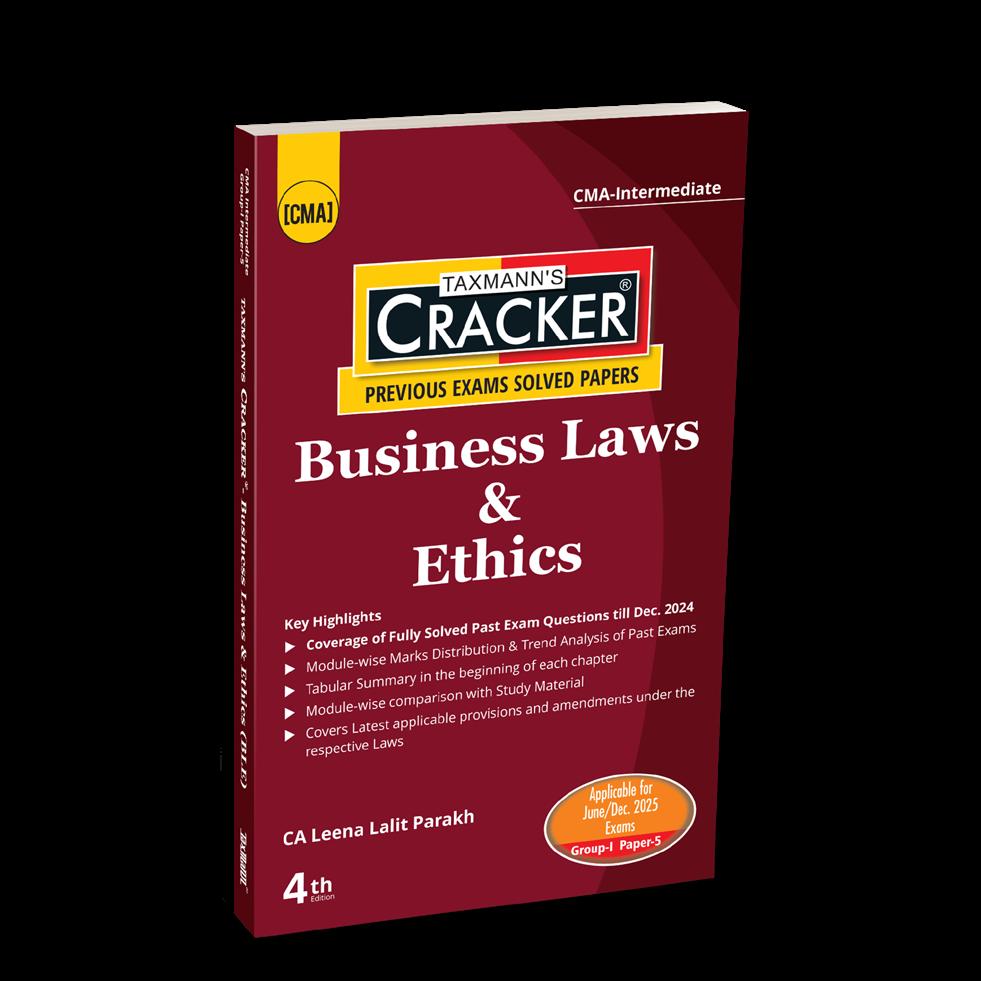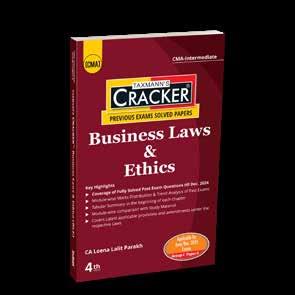INDIAN CONTRACT ACT, 1872
MODULE
CHAPTER 2.1
ESSENTIAL ELEMENTS OF A CONTRACT, OFFER & ACCEPTANCE
A Quick Review
Section Particulars
2(a) Proposal/offer
2(b) Promise
2(c) Promisor & Promisee
2(d) Consideration
2(e) Agreement
2(h) Contract
De nition
When one person signi es to another, his willingness to do or to abstain from doing anything, with a view of obtaining the assent of that other person to such act, abstinence, he is said to make proposal.
When the person to whom the proposal is made signi es his assent thereto, the proposal is said to be accepted. A proposal when accepted becomes a promise.
The person making the proposal is called “promisor” & person accepting it is called “promisee”.
When at the desire of the promisor, the promise or any other person has done or abstained from doing, or does or abstains from doing or promises to do or abstain from doing something, such act or abstinence or promise is called consideration.
Every promise & every set of promises, forming the consideration for each other is an agreement.
An agreement between two or more parties enforceable by law.
MEANING OF CERTAIN TERMS
Voidable contract
Void ab initio
An agreement which is enforceable by law at the option of one or more parties thereto but not at the option of other is a voidable contract. Ex. Any one of the essential element of valid contract is missing.
The agreement which from the very beginning is null and void with no legal enforceability is called void ab initio.
2.2
Void agreement
SECTION A : COMMERCIAL LAWS
An agreement not enforceable by law is said to be a void agreement. It is void ab initio
Void contract A contract which ceases to be unenforceable by law becomes void. Void contract is initially a perfectly valid contract but subsequent development turns it into a void contract.
ESSENTIAL ELEMENT OF VALID CONTRACT:
Elements
Explanation
Agreement For valid contract there must be an agreement which further comprises of offer (whose terms must be de nite) & acceptance (which should be absolute & unconditional) between 2 or more parties.
Free consent If the consent of the parties is obtained through coercion, undue in uence, fraud, misrepresentation or mistake then a valid contract cannot take place. The consent must be free.
Lawful consideration Consideration means something in return. It may be an act or abstinence. But it should be real & lawful.
Competent parties
Legality of object
Legal relationships
A competent person is one who is 1. At least of 18 years 2. Of sound mind 3. Not disquali ed by any law for contracting. If any point is missing in the person then he cannot be termed as competent person.
The object of the contract must be legal or else the contract will not be valid.
Parties must create legal relationship. Agreements with social or domestic obligations are not contract.
Agreements not to be expressly declared void Agreements should not be void or illegal.
Certainty & capability of performance
Legal formalities
The terms & conditions of agreement must be certain & capable of being performed.
There are certain legal formalities to be ful lled until which the agreement cannot be enforced. For e.g. Registration, etc. The contract can be oral or written. Written is preferable.
LEGAL RULES REGARDING OFFER
Offer may be expressed or implied
Offer may be speci c or general
Offer must give rise to legal obligation
Terms of an offer must be de nite and certain
Offer must be distinguished from an invitation to offer
Offer must be communicated
Offer must be made with a view to obtaining the consent of the other party
Offer should not impose an unnecessary obligation to communicate non-acceptance
Communication of Special Terms
Offer to make an offer is not an offer
LEGAL RULES REGARDING ACCEPTANCE
Acceptance must be absolute and unquali ed
Acceptance must be communicated
Acceptance must be in a prescribed or reasonable mode
Acceptance must be given within a reasonable time and before the offer lapses
Acceptance cannot precede an offer
Acceptance must be given only by the person to whom the offer is made
Rejected offer can be accepted only on renewal
Revocation of acceptance
Acceptance to give an acceptance is not an acceptance WHEN COMMUNICATION IS COMPLETE,
IN DIFFERENT CASES
Offer Acceptance Revocation
As per Para 1 of sec. 4, the communication of offer comes to an end when it comes to the knowledge of the person to whom it is made.
As per Para 2 of sec. 4, Communication of acceptance against proposer is complete when it is put into course of transmission to him & out of reach of acceptor. Communication of acceptance against promisee or acceptor is complete when it comes to the knowledge of the proposer.
As per Para 3 of sec. 4, Communication of revocation comes to an end against the person who revocates it, when it is put into course of transmission to whom it is made & out of reach of person revocating it. Communication of revocation comes to an end against the person to whom it is made when it comes to his knowledge.
PAST EXAMINATION QUESTIONS
OBJECTIVES
Fill in the blanks:
Q. 1. The maximum number of parties in a contract may be _______________.
Ans. Infinite [June 2016, 1 Mark]
Q. 2. Acceptance may be either general or . Ans. Special [July 2023, 1 Mark]
SECTION A : COMMERCIAL LAWS
Multiple Choice Questions:
Q. 1. Cash is withdrawn by a customer of a bank from the automatic teller machine is an example of:
(
a) Express Contract
(b) Void Contract
(
c) Tacit Contract
(
d) Illegal Contract
Q. 2. In social agreements usual presumption is:
(
a) That parties do not intend to create social relations.
(
(
(
b) That parties intend to perform them.
[Dec. 2013, 1 Mark]
c) That parties do not intend to make legal and social relations.
d) That the parties do not intend to create legal relations between them.
[Dec. 2014, 1 Mark]
Q. 3. Which of these are sources of Indian Contract Act?
(
a) Law framed by East India Company
(
b) American Mercantile Law
(
c) Vedas and Purans
(
d) English Mercantile Laws
[Dec. 2015, 1 Mark]
Q. 4. If the Act has been done before any promise is made, it is called:
(
a) Present consideration
(
b) Past consideration
(
c) Future consideration
(
d) Executory consideration
[Dec. 2015, 1 Mark]
Q. 5. A goods displayed in a shop with a price tag is a ______________.
(
(
a) Offer
b) Invitation to offer
(c) Counter offer
(d) None of the above
Q. 6. A contract is a combination of:
(a) Agreement and free consent
(
(
(
b) Agreement and consideration
c) Agreement and enforceability
d) Agreement and competence of parties
Q. 7. Which of the following is an invitation for offer?
(
(
(
(
a) A tender to supply goods at a certain time
b) A request for a loan
c) Bids in an auction sale
d) A catalogue of goods for sale
[Dec. 2015, 1 Mark]
[June 2016, 1 Mark]
[June 2017, 1 Mark]
Q. 8. A invites B for his son’s wedding. B accepts the invitation. In this case, there is an agreement but no contract since:
(
a) There is no consideration.
(b) There is no intention to create legal relationship.
(c) There is no written document.
(d) There is no formal acceptance of the offer. [Dec. 2017, 1 Mark]
Q. 9. A proposal may be revoked at any time before:
(a) The communication of acceptance
(b) The payment of consideration
(c) Signing the agreement
(d) Execution of the proposal [Dec. 2018, 1 Mark]
ANSWERS: 1. (c) 2. (d) 3. (d) 4. (b) 5. (b) 6. (c) 7. (d) 8. (b) 9. (a)
THEORY QUESTIONS
Q. 1. When a communication of a revocation of an offer is complete. [June 2014, 2 Marks]
Ans. As per Section 4(3) of Indian Contract Act, 1872, the communication of a revocation of offer is complete:
As against the person who revocates it: When it is put into a course of transmission to the person to whom it is made, so as to be out of power of the person revocating it.
As against the person to whom it is made: When it comes to his knowledge.
Q. 2. An offer may contain a term, the non-compliance of which would amount to acceptance. Give correct answer. [Dec. 2014, 2 Marks]
Ans. The offer should not impose on the offeree an obligation to reply, while making the offer, the offeror cannot say that if the offer is not accepted before a certain date it will be presumed to have been accepted, unless the offeree sends his reply, no contract will arise. There is no requirement for the acceptor to send communication of non-acceptance.
PRACTICAL QUESTIONS
Q. 1. Mr. A offers to buy Mr. B’s house on certain terms. Acceptance was to be sent by B within 6 (six) weeks. B within one week sent a letter accepting the offer with an alteration of one term. A then withdrew his offer. B writes again within three weeks accepting the terms originally proposed by A. Hence is this a valid contract? [June 2013, 2 Marks]
SECTION A : COMMERCIAL LAWS
Or
W offered to sell his house to M for ` 40 lakhs. M replied purporting to accept the offer and enclosed a cheque for ` 20 lakhs. He also promised to pay the balance amount in twenty equal instalments. Examine the validity of the contract. [June 2014, 2 Marks]
Or
A offers to buy B’s House on certain terms. An answer is to be given within six weeks. B within this time writes to A a letter purporting to accept but in fact containing a material alteration of the terms. A then withdraws his offer. B writes again still within 6 weeks correcting the error in his first letter and accepting the terms originally proposed by A. Is there a contract between A and B? Give reasons for your answer. [Dec. 2015, 2 Marks]
Ans. A proposal accepted by the offeree is termed as acceptance. An offer can be accepted by the person to whom the offer is made.
As per Section 7(1) of Indian Contract Act, 1872, acceptance must be absolute and unqualified. A qualified acceptance or a counter offer, offering different terms amounts to counter proposal leading to rejection of offer i.e. offer comes to an end. No contract would come into existence even if the offeree wants to subsequently accept the original offer after withdrawal of offer as it will be deemed to have lapse. In given case, B made a qualified acceptance by altering certain terms of the original offer. So, A withdraws the same. Then, B subsequently changes his mind and wants to accept the terms originally offered by A within the specified time. This will not give rise to any contract since the original offer of A will be deemed to have been lapsed.
Moreover, it is not binding on the part of A to keep his offer open for six weeks. The contract is not valid. Now, if B still wants to purchase A’s house, he will have make a new offer to A or wait for A’s new offer.
In 2nd question also there is alteration of terms making acceptance qualified resulting in an invalid contract.
Q. 2. Mr. Rabin tells Miss Rekha that Mr. Rajib expressed his willingness to marry Miss Rekha on 25th December, 2014. This is a valid contract. Comment. [Dec. 2014, 2 Marks]
Ans. As per Section 10 of Indian Contract Act, 1872, the essential condition of communication of offer from one party to another must exist.
In given case, there was no communication between Mr. Rajib & Ms. Rekha is missing.
Therefore, this is neither a valid agreement nor a contract.
Q. 3. Makhan, seeing a mobile phone in a showcase of a shop which was marked for sale for ` 2,000, enters the shop, places ` 2,000 on cash counter and told to give him displayed mobile. Shop owner refused. Can the shop owner refuse to sale the displayed mobile? [Dec. 2014, 3 Marks]
Ans. There is a difference between offer & invitation to an offer. Price quotations and price tags do not amount to an offer but are only an invitation to an offer. Therefore, Makhan’s picking up the mobile with price tag of ` 2000/- amounts to an offer by Makhan to purchase the same at that price. It remains to be accepted by the seller i.e. the salesman at the cash counter of the mobile store, to result it in a concluded contract. The salesman has every right to accept or refuse the offer. Thus Makhan shall have no remedies.
Q. 4. X Father promised to pay his son Y a sum of ` 1 lakh if Y (son of X) passed CMA examination in the first attempt. Y passed the CMA examination in his first attempt, but X failed to pay the amount as promised. Y files a suit for recovery of the said amount. State along with reasons whether Y can recover the amount under the Indian Contract Act, 1872. [Dec. 2014, 5 Marks]
Ans. As per Section 10 of Indian Contract Act, 1872, for making a contract valid, there should be an intention to create legal relationship between the parties. An agreement of a social nature or domestic nature does not create legal relationship and as such cannot be termed as enforceable contracts. In given case, X promised his son to pay him ` 1 lakh. It is an agreement of social or domestic nature creating no legal relations. So, Y cannot recover the amount of ` 1 lakh from X.
CHAPTER 2.2
VOID & VOIDABLE AGREEMENTS
A Quick Review
AGREEMENTS EXPRESSLY DECLARED
11 Agreement by a minor
12 Agreement by a person of unsound mind
20 Agreement made under a bilateral mistake of fact material to the agreement
23 Agreement of which the consideration or object is unlawful
24 Agreement of which the consideration or object is unlawful in part and the illegal part cannot be separated from the legal part.
25 Agreement made without consideration
26 Agreement in restraint of marriage of any person, other than a minor, is void.
27 Agreement in restraint of trade i.e. from exercising a lawful profession, trade or business of any kind, is void. The exception is of sale of goodwill.
Section
SECTION A : COMMERCIAL LAWS
Details of agreements
28 Agreement in restraint of legal proceedings
Agreement by which any party is restricted absolutely from enforcing his rights under or in respect of any contract, by the usual legal proceedings in the ordinary tribunals, or which limits the time within which he may thus enforce his rights; or
Which extinguishes the rights of any party or discharges any party from any liability, under or in respect of any contract on the expiry of a speci ed period so as to restrict any party from enforcing his rights, is void
29 Agreements, the meaning of which is not certain, or capable of being made certain, are void. Uncertain agreements.
30 Agreements by way of wager are void; and no suit shall be brought for recovering anything alleged to be won on any wager, or entrusted to a person to abide by the result of any game or other uncertain event on which any wager is made. Wagering agreements.
36 Agreements contingent on impossible events E.g. Meeting of 2 parallel lines.
56 Agreements to do impossible acts. Impossibility may be at the time of entering into a contract or subsequent to the formation of the contract but before performance of the contract.
57 In case of reciprocal promises to do things legal and also other things illegal, the second set of reciprocal promises is a void agreement.
PAST EXAMINATION QUESTIONS
OBJECTIVES
Fill in the blank:
Q. 1. Agreement by wager is _____________________________.
Ans. Void
Multiple Choice Questions:
[Dec. 2017, 1 Mark]
Q. 1. If part of contract is illegal, then the whole contract will be:
(a) Voidable
(b) Void
(c) Legal
(d) Illegal
[June 2014, 1 Mark]
Q. 2. Which of the following agreement is wagering agreement under the Indian Contract Act, 1872?
(a) Crossword competition involving application of skill and knowledge.
(b) Contract of Insurance.
(c) A promise to pay B ` 1,000 if it rains on Monday.
(d) A agrees to pay B ` 1,000 if two straight lines should enclose a space. [Dec. 2015, 1 Mark]
ANSWERS:
PRACTICAL QUESTIONS
Q. 1. Mr. P and Mr. Q bet as to whether there would be rain on a particular day of December. Mr. P promises to pay ` 5,000 to Mr. Q if there is rain on that day and Mr. Q promises an equal amount to Mr. P if there is no rain on the day. Suppose, there is no rain on that specific day of December and Mr. Q filed a suit for recovery of ` 5,000 from Mr. P. Can Mr. Q recover the amount under Indian Contract Act, 1872? [June 2017, 6 Marks]
Ans. As per Section 30 of Indian Contract Act, 1872, an agreement by way of wager are void and no suit shall be brought for recovering anything alleged to be won on any wager or entrusted to any person to abide the result of any game or other uncertain event on which any wager is made.
In given case, the agreement between Mr. P and Mr. Q is of wagering nature and hence void. Thus, despite of no rain on specific day of December, Mr. Q cannot recover the amount of ` 5,000 from Mr. P for the reason of entering into an agreement of a wagering nature.
Q. 2. A agreed to become an assistant for five years to B who was a doctor practicing at Chennai. It was also agreed that during the term of agreement A will not practice on his own account in Chennai. At the end of one year, A left the assistantship of B and began to practice on his own account. Referring to the provisions of the Indian Contract Act, 1872, decide whether A could be restrained from doing so. [Dec. 2017, 5 Marks]
Ans. As per Section 27 of Indian Contract Act, 1872, any agreement through which a person is restrained from exercising a lawful profession or trade/business is void. But, an agreement of service by which a person binds himself during the term of the agreement not to take service with anyone else directly or indirectly to promote any business in direct competition with that of his employer is not in restraint of trade.
In given case, A agreed not to practice during the term of agreement & as soon as he left, he began to practice leading to breach of contract. Therefore, the step taken by A is not correct & he can be restrained by an injunction from doing so.
Q. 3. Mr. X, a businessman has been fighting a long drawn litigation with Mr. Y, another businessman. To support his legal campaign Mr. X enlists the services of Mr. Z, a legal expert, stating that an amount of ` 10 lakhs would be paid, if Mr. Z does not take up the brief of Mr. Y. Mr. Z agrees, but at the end of the litigation Mr. X refuses to pay. Decide whether Mr. Z can recover
SECTION A : COMMERCIAL LAWS
the amount promised by Mr. X under the provisions of the Indian Contract Act, 1872. [June 2018, 5 Marks July 2023, 5 Marks]
Ans. As per Section 10 of Indian Contract Act, 1872, an agreement must not be one which the law declares to be either illegal or void. It is one of the essentials of a valid contract. Any agreements in restraint of trade, marriage, legal proceedings etc. are void agreements.
In given case, Mr. Z was to be paid by Mr. X for not taking briefing of Mr. Y, which is wrong legally & thus void.
Mr. Z cannot recover the amount of ` 10 lakhs promised by Mr. X because it is an illegal agreement and cannot be enforced by law.
CHAPTER 2.3 CONSIDERATION
A Quick Review
NO CONSIDERATION – NO CONTRACT
The general rule is ex-nudo pacto actio non oritur i.e. an agreement made without consideration is void. For example if A promises to pay B `1000 without any obligation from B. This is a void agreement for want of consideration. However, the Act itself provides exceptions to this rule in section 25 itself. As per section 25, an agreement made without consideration is not void in the following circumstances:
Promise made on account of natural love and affection.
Promise to compensate for voluntary services.
Promise made to pay a time barred debt.
Completed Gifts.
Creation of agency.
Contract of Guarantee.
Remission.
LEGAL RULES REGARDING CONSIDERATION
It must move at the desire of the promisor
It may move from the promisee or any other person
Consideration must be something of value.
It may be an act, abstinence or forbearance or a return promise.
It may be past, present or future which the promisor is already not bound to do.
It must not be unlawful.
Consideration need not be adequate.
It must not be illusory.
It must not be opposed to public policy.
Pre-existing obligations.







